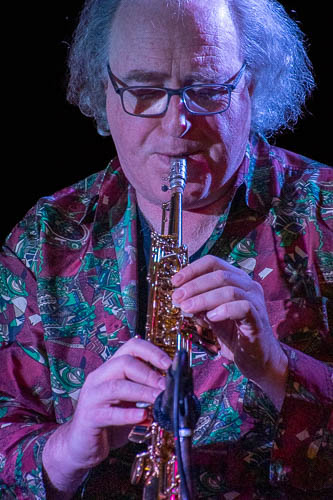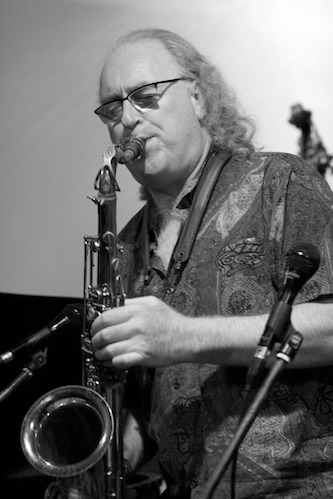Jazz Interview: Talking to Russ Gershon, Cornerstone of the Local Jazz Scene
By Jason M. Rubin
In any form, any format, anytime and any place, the presence of Russ Gershon is an imprimatur of exciting, eclectic, and innovative music.

Russ Gershon on soprano sax. Photo: courtesy of the artist
For more than 40 years, Russ Gershon has been a mainstay on the Boston music scene. From rock to jazz to world music to classical, he has immersed himself in a host of genres like a hungry bear at a honey and berry buffet. Through the vicissitudes of the music industry, the coming and going of physical and radio programming formats, and, of course, Covid-19, Gershon is busier than ever these days. As a radio host, he spins jazz at GBH and classical at CRB; teaches at Brookline Music School; leads no fewer than three active and diverse ensembles; and always jumps at the chance to serve as a hired gun for other musicians’ projects. And while the business of selling platters and discs has largely become a losing proposition, he remains the head of Accurate Records, which he founded back in 1986. Accurate has released more than 100 titles, including the debut recordings of Morphine and Medeski, Martin & Wood. Finally, though his groundbreaking Either/Orchestra has been inactive for a number of years, Gershon has the power to revive it with just a few phone calls.
As a longtime listener, I wanted to know from where this entrepreneurial saxophonist and musical traveler gets his indefatigable energy, enthusiasm, and inspiration.
AF: When did you first come to Boston and decide to become a professional musician?
Russ Gershon: I grew up in Westport, Connecticut, and Queens, New York. I was always into rock music but in my teens I got the jazz bug. I would go into New York City and, even though I was underage, I could get into places like the Village Vanguard. I was really lucky because in the ’70s there was a bounty of jazz, and many of the greats from all eras were still alive. I didn’t start playing sax until I was 17. My friends were more advanced than I was but we would jam for hours. When I came to Boston in 1977 as a Harvard undergraduate, I realized I needed to really learn how to play. At the time, though, my ultimate goal was to go to Columbia Journalism School. Bob Woodward and Carl Bernstein were my heroes.
AF: But the jazz bug wouldn’t let go?
RG: At first, I played in rock bands. While still in college, I was in the Decoders from 1980 to 1982, playing blues and rock and roll with a touch of new wave. In 1981, we did a summer tour of roadhouses in Montana, Idaho, and Wyoming, playing four sets a night, four to seven nights a week and hoping not to get beat up. It taught me a lot about playing for audiences and surviving life on the road. When we broke up, I joined a band called the Sex Execs, which lost to Til Tuesday at the Rock and Roll Rumble. When that band broke up in 1984, I decided I needed to learn more about playing sax and writing music. I went to Berklee for three semesters. After that, I had some music I had written and so I assembled a rehearsal band just so I could hear what it sounded like. This eventually became the Either/Orchestra.
AF: The Either/Orchestra was the first jazz group I’d ever seen that looked like they were having fun. The music was unorthodox: you would combine songs by Thelonious Monk and Bobbie Gentry into a medley. Was there an intentionally anarchic philosophy behind the band?
RG: I had eclectic tastes: Sun Ra, Mingus, Monk, Gil Evans, Art Ensemble of Chicago. Everything from swing to avant garde. Basically I just created the music that I wanted to listen to. I would think, “What would keep me entertained?” And then there were all these great musicians in the band and I wanted to play to their strengths. That’s how the music came about. I thought we sounded good so I wanted to record us, which led to the creation of Accurate Records. I had done some deejaying at Harvard so I knew how to promote records. I sent out 500 or so copies of the album [Dial “E” for Either/Orchestra, 1986] to radio stations across the country, along with response cards asking for information about places we could play. Locally, we were written up by the Boston Globe, which got us a lot of wedding gigs; a portion of the money we made doing that helped to fund our first three tours and allowed us to bring the E/O message to the people.

Russ Gershon in action on the saxophone. Photo: Chris Burbul
AF: Over time, the E/O became very interested in Ethiopian music. How did that come about?
RG: It happened organically. My friend Mark Sandman [Morphine] gave me an album of Ethiopian music. We both shared an enthusiasm for African music. It blew my mind. I listened to it constantly for years before it even occurred to me I could write arrangements for the E/O. The band had been on hiatus and I re-formed it with some new members, making it more of an international band. This was in 1996 and the music really connected with people. One day I got an email from Francis Falceto, a French music producer who had put together the original album that Mark had given me. He was interested in what we were doing so I went to France to meet him and he invited us to play at a festival in Addis Ababa; we were one of the first Western artists to play this festival. We stayed with it because we loved the music and people were interested in it. Our last concert before the pandemic was with Ethiopian singer Teshome Mitiku. I have many albums’ worth of material we recorded, but in this day and age it’s hard to put them out in a proper format and break even, let alone make a profit. I want to find some way to release the music.
AF: You have three active projects right now: The Russ Gershon Trio, Lookie Lookie, and Listen To This. Tell me about them.
RG: I’ve always done the trio as a side project since E/O days. Being smaller, it’s easier to organize and as a soloist I don’t have to share the time with a bunch of other guys. I’ve been pushing it more in the last 10 years as my playing has advanced further. I also sing and play flute, so instead of having an arsenal of other musicians to lean on, I am the arsenal. And with this stripped down format, I get to revisit the musicians that really got me going as a teenager: Rahsaan, Arthur Blythe, Mingus, Ornette. We even bring some rock songs into a jazz format, including ones from the Monkees and Richard Thompson.
Lookie Lookie came about when former Human Sexual Response bassist Chris Maclachlan fell in love with bugalu music, a form that originated among the Puerto Rican community in New York in the mid-’60s. Chris was pulling people together to jam on these grooves and he invited me to join. I realized that the players needed charts so I started writing out charts for them. Vicente Lebron, who had been in the E/O, knew the songs, so I brought him in. With his vocals and conga playing, he took the band up a notch, and it evolved into a kind of vintage Latin Pop band. This is among the most fun music I’ve ever played.
Listen To This has its origins in another old friend, drummer Jerome Deupree (Decoders, Sex Execs, E/O, Morphine). Four years ago he told me he wanted to form a band that played early electric jazz, the gateway music we listened to when we were teenagers — before fusion got a “bad name.” We got together for a couple of sessions but had to put it aside because of the pandemic. We picked it up again a year ago and decided to focus the repertoire on the early electric recordings of Miles Davis, from 1968 to 1975. Our first gig was in May 2022. The great thing about it is that the compositions are so loose; his music is based on very simple vamps and chords. We’ve learned 15-20 songs from that era but, more importantly, we’re working with the daring ways that Miles and his bands structured their performances.
AF: In any form, any format, anytime and any place, the presence of Russ Gershon is an imprimatur of exciting, eclectic, and innovative music. Each of the above three projects has its own Facebook page. More information on Russ can be found on AccurateRecords.com. His busy schedule includes the following dates:
- Friday, July 21, 3:30 p.m.: Lookie Lookie, Western Front Cannabis grand opening, Cambridge
- Saturday, July 29, 12-2 p.m.: Russ Gershon Trio plus John Mulkerin (Defunkt), Boston UnCommon Stage (Emerson College), Boston
- Sunday, July 30, 4-6 p.m.: Russ Gershon Trio, Mad Monkfish, Cambridge
- Friday, August 4, 9 p.m.: Swampanova, comprising Russ and former members of Bim Skala Bim, Lizard Lounge, Cambridge
- Thursday, August 10, 6:30-8 p.m.: Lookie Lookie, Condon Shell Summer Concert Series, Medford, MA
- Thursday, September 21: Lookie Lookie, Somerville Armory, Somerville, MA
- Saturday, September 23 (day), Lookie Lookie, Watertown’s Faire on the Square, Watertown, MA
- Saturday, September 23 (night), Listen To This, Boston Harbor Distillery, Boston
- Saturday, November 4: Lookie Lookie, Boston Harbor Distillery, Boston
Jason M. Rubin has been a professional writer for nearly 40 years, more than half of those as senior creative lead at Libretto Inc., a Boston-based strategic communications agency, where he has won awards for his copywriting. He has written for Arts Fuse since 2012. Jason’s first novel, The Grave & The Gay, based on a 17th-century English folk ballad, was published in September 2012. Ancient Tales Newly Told, released in March 2019, includes an updated version of his first novel along with a new work of historical fiction, King of Kings, about King Solomon and the Queen of Sheba. His latest book, Villainy Ever After (2022), is a collection of classic fairy tales told from the point of view of the villains. Jason is a member of the New England Indie Authors Collective and holds a BA in Journalism from the University of Massachusetts Amherst. jasonmrubin.com.
Tagged: Accurate Records, Listen To This, Lookie Lookie, Russ Gershon
